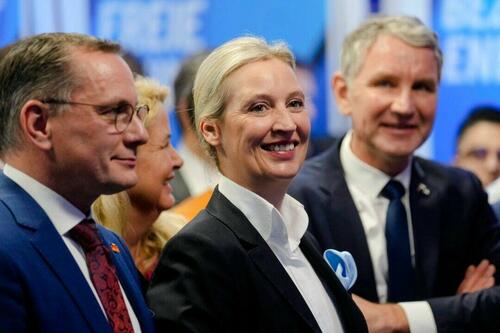Authored by Owen Evans via The Epoch Times (emphasis ours),
Alternative for Germany (AfD) has become the most popular party in the country, according to a poll released on Aug. 12.

The poll, conducted by the Forsa Institute for Social Research and Statistical Analysis on behalf of RTL Deutschland, showed that 26 percent of Germans would vote for the AfD.
The AfD, an anti-mass immigration party, came second in Germany’s national parliamentary elections, earning nearly 21 percent of the vote.
The new polling puts the right-wing party ahead of German Chancellor Friedrich Merz’s mainstream conservative bloc, the Christian Democrats (CDU) and their Bavarian allies, the Christian Social Union (CSU).
The CDU/CSU slid to 24 percent, its worst result since the 2021 federal election.
Germany’s manufacturing sector, the largest in Europe, has had two years of contraction and is expected to broadly stagnate in 2025, according to an EU Commission macroeconomic forecast.
Only 14 percent of poll respondents said they expected the economic situation to improve, while 62 percent anticipated a deterioration, which it said was “the highest pessimism level” of the current year.
Germany is also struggling with the loss of affordable Russian gas, historic Volkswagen plant closures, and fierce competition from cheaper Chinese electric vehicles.
The country has gone through a major population change, with its net population increasing by more than 3.5 million between 2014 and 2024, driven entirely by migration.
During this period, the number of German citizens fell by 2 million to 71.6 million, while the foreign population grew to 13.1 million from around 7.5 million, Statistics Office data showed.
In 2015, under Chancellor Angela Merkel, more than 1 million refugees, many of them from Syria, as well as Afghans and Iraqis, arrived in Germany.
One hundred days after Merz’s election as chancellor, his approval ratings have fallen to a record low, with 67 percent “dissatisfied” with his work.
The poll showed that “dissatisfaction” is particularly pronounced among supporters of the AfD, at 95 percent.
In February’s general election, Merz fell short of forming a majority government, as is often the case in German politics, and, after lengthy negotiations, his party formed a coalition with the center-left Social Democrats (SPD).
At the time, Merz ruled out the party forming a government with the AfD.
Forty-three percent of respondents said they expected the CDU/CSU/SPD coalition to end early.
AfD’s policies include strong support for traditional marriage between a man and woman, the preservation of national independence in the face of the European Union’s increasing power, the preservation of German culture amid “European integration” and Islamization, and border security, including the expulsion of illegal immigrants.
Last year, Tesla and SpaceX CEO Elon Musk deepened his support for the party, defending it against accusations of extremism and championing its policies as the nation’s best path forward during challenging times.
Robin Brooks, a senior fellow in the global economy and development program at the Brookings Institution, said in an Aug. 13 X post that “Germany is in real trouble.”
“Its political center refuses to confront immigration, which is the issue driving relentless AfD growth,” he said. “Instead, the political center name-calls AfD voters. Dereliction of duty.”
Despite gaining considerable proportions of the vote, populist parties such as the AfD have been frozen out of governing coalitions in Europe by political opponents who regard them as extremist.
In Austria, conservatives, Social Democrats, and liberals formed a coalition in March to block the anti-immigration and euro-skeptic Freedom Party from taking power, even after it won an electoral victory with 29 percent of the vote in September 2024.
French President Emmanuel Macron on June 9, 2024, called a surprise snap parliamentary election following his centrist Renaissance party’s poor performance in European Parliament elections, when the populist and nationalist party National Rally (RN) performed very strongly.
RN, which recently polled at 35 percent, has increased its voter share ahead of the French presidential elections, which are scheduled to be held in or around April 2027.
Loading recommendations...